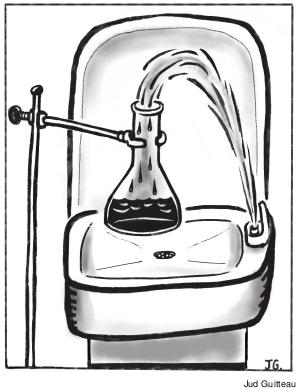No lead in new fountains

Winning the guarantee of clean and safe drinking water at the School of Professional Studies (SPS) has not been easy. PSC activists have waged a years-long battle, and they recently secured another victory: SPS administration agreed to the PSC’s demand to test four recently installed water fountains located in a building with a history of bad water quality. The fountains in question were tested on May 22 and the results found no metals in the water fountains, said Susan Fountain, an adjunct professor at the School of Professional Studies who has been organizing around the issue.
“I’m relieved that there’s a place that [faculty, staff and students] can get decent water,” said Fountain.
This peace of mind was earned not through any safety initiative on the administration’s part, but thanks to union organizing.
ONE VOICE
More than 20 PSC members showed up to an April 30 town hall meeting about water quality where CUNY Director of Environmental Health, Safety and Risk Management Howard Apsan fielded questions.
“All those people were there and they spoke with one voice,” said Fountain. “They made it known that they were concerned.”
Faculty and staff who work at 119 West 31st Street, where SPS and Guttman Community College hold classes, have been dealing with water issues for several years, as first reported by Clarion in March 2017. There have been elevated levels of copper – above the EPA action level of 1.3 parts per billion and lead below the EPA action level of 15 parts per billion – detected in some of the building’s drinking water.
Fountain recalled SPS’s response was to hand out bottled water. She also noted there was poor communication and inadequate information, and a reluctance to take corrective action where results were below EPA action levels. Each time, PSC activists demanded that water be tested and the results shared.
“When management doesn’t release the full test results, they’re taking away [workers’ and students’] abilities to make their own health decisions,” Fountain said. “My argument is to get the info out to people so they can make their own choice on whether or not to drink the water.”
Near the beginning of 2018, new water fountains were installed in hallways, but were not turned on until months later in December 2018. SPS had promised that the fountains would be tested before they were turned on. They were not. Instead, they were tested five months later, after organized pressure from the PSC.
In September of 2018, water coolers appeared next to the non-functioning water fountains without explanation. It was only months later – and only after union pressure – that union activists found out that water quality testing done in six office suites in August had found lead levels in four of the fountains, including one with levels only slightly below the EPA action level.
FEDERAL LEVELS
No level of lead in water is safe, according to a senior administrator at the EPA’s Office of Water who was interviewed for a story by NPR. When the EPA drafted the Lead and Copper Rule, the NPR report noted, it designed the rule in terms of what could be reasonably achieved rather than defining safe levels. The Safe Drinking Water Act, passed by Congress in 1974, sets non-enforceable maximum contaminant levels goals (MCLGs), which are safe levels that will likely not cause any adverse health effects. And for lead, EPA set that level at zero. The EPA website notes that lead is persistent and bioaccumulates over time. In adults it can contribute to high blood pressure and decreased kidney function, among other health effects.
“For many water contaminants, the MCLGs designate a tolerable level of exposure that can be sustained without risk of health effects,” said Jean Grassman, co-chair of the PSC Health and Safety Watchdogs and an associate professor of Environmental, Occupational, and Geospatial Health Sciences of the CUNY Graduate School of Public Health and Health Policy. “Lead is different. The epidemiological evidence clearly shows that there’s no safe level of exposure. We’re really concerned about women who might be pregnant and not know that they are placing their unborn children at risk.”
Kelly Cunningham, a communications and publications design coordinator at the school, drinks the water every day with a little bit of reservation. She went to the town hall meeting, despite having multiple deadlines, and voiced her concerns.
“I was speaking from the perspective of having the water fountains tested and doing an annual testing of the water,” Cunningham said. “We should have some reassurance.” Cunningham thinks that there are proactive steps the administration can take to ensure and monitor water quality, and testing the water fountains is one of those steps.
Fountain said this latest win “is small but huge at the same time.
“I can only attribute it to so many people turning out [and expressing concern],” Fountain said. “It moved the needle.” Because of past problems with the building’s water, PSC activists will continue to push for ongoing monitoring of the water at SPS.

